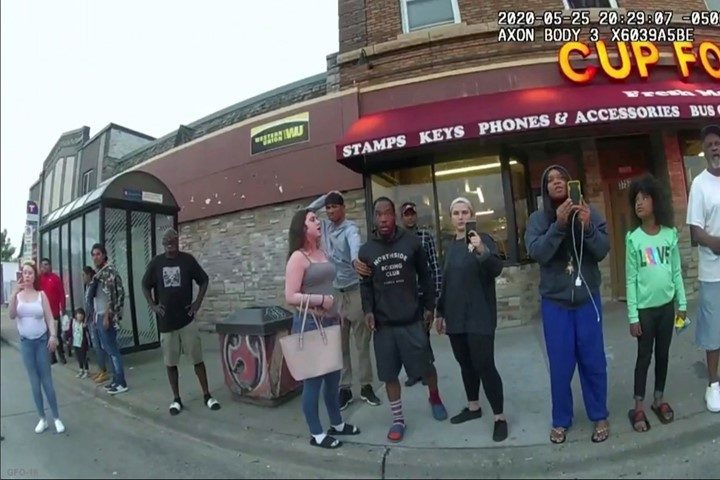
Darnella Frazier, the teen who used her cellphone to record the arrest and death of George Floyd last year, received a special citation Friday from the Pulitzer Prize Board for her “transformative” footage seen around the world.
Frazier, then 17, was cited for “courageously recording the murder of George Floyd, a video that spurred protests against police brutality around the world, highlighting the crucial role of citizens in journalists’ quest for truth and justice,” at the end of ceremony announcing the 2021 Pulitzer Prize winners.
The Pulitzer Prize jury has the option of awarding special citations and awards where they consider necessary. Previous special citations have been awarded, among others, to Ida B. Wells, an African American journalist and activist who led an anti-lynching crusade; Aretha Franklin, aka “Queen of Soul,” a singer and pianist who defined the golden age of soul music of the 1960s; and Duke Ellington, jazz pianist, composer, and bandleader, who is considered “the most important creative forces in the music of the twentieth century.”
The Special Citation is not the first prestigious award received by Frazier. In December, a young girl was awarded the 2020 PEN/Berenson Courage Award from Oscar-winning director Spike Lee. PEN America, the literary and human rights organization, honored Frazier along with other activists, artists and former president Barack Obama. “With nothing more than a cell phone and sheer guts, Darnella changed the course of history in this country, sparking a bold movement demanding an end to systemic anti-Black racism and violence at the hands of police,” said PEN America CEO Suzanne Nossel.
Frazier’s video of the incident went viral, drawing attention to Floyd’s death and ultimately propelling thousands of “racial justice” protests across the United States and abroad. The mayhem of the resulting riots cost American cities at least $2 billion, defunded and demoralized police departments, and subsequently led to skyrocketed crime rates that in many cases targeted the black population.
Reportedly, on the day of George Floyd’s death, Frazier was visiting one of the street stores with her 9-year-old cousin when she saw Chauvin and several other officers restraining Floyd on the ground. Surveillance footage from the street shows Frazier and her younger cousin walking by the police car to the store entrance, past Floyd and the officers on the ground. Frazier then turns back after her cousin goes into the store and begins recording. Floyd was already begging for air and gasping “I can’t breathe” at the beginning of Frazier’s video.
The video became a key piece of evidence at the trial of former officer Derek Chauvin, convicted in April of murdering Floyd who had a “fatal level” of fentanyl in his blood.
Frazier also delivered emotional testimony at the trial. Among other things, she said the crowd was yelling at the officers to stop kneeling on Floyd. She said she felt threatened by the officers, specifically Chauvin and Tou Thao, because she saw them put their hands on their mace when people tried to get close. Frazier’s testimony suggests she didn’t understand why the policemen who were restraining a suspect would need to let the shouting crowd — which was arguably unruly and might have divert officers’ attention from dying Floyd — know that their interference is not welcome.
Journalists, activists, and politicians were among those who cheered news of Frazier’s award. Los Angeles Times editorial page editor Sewell Chan tweeted that Frazier’s video “shook the conscience of the nation and the world.”
“Without Darnella, Derek Chauvin never would have been tried and George Floyd would have been blamed by the state for his own death,” activist Brittany Packnett Cunningham told The 19th. “It’s powerful to see this act recognized for what it is—an act of journalistic truth-telling.”
The Pulitzer Prize is named after 19th-century media mogul Joseph Pulitzer who is believed to be “the very embodiment of American journalism.” It is considered the most prestigious media award in the U.S.
This year, winning entries focused either on the COVID-19 pandemic, the summer of riots, or politics of race. For its coverage of Floyd’s death and the uprisings that followed, Minneapolis’s Star Tribune was awarded the Pulitzer for Breaking News Reporting, for which the staff at the Courier-Journal was a finalist for its reporting that challenged the narrative put forth by police following the killing of Breonna Taylor. Mitchell S. Jackson, a freelance contributor to Runner’s World, was awarded a Pulitzer for Feature Writing for “Twelve Minutes and a Life,” a meditation on the life and killing of Ahmaud Arbery and examination of how running culture “fails Black America.”
Winners of previous years were as “woke” and mainstream — for example, in 2020, the Commentary Pulitzer went to Nikole Hannah-Jones of the New York Times for her flagship essay in the controversial “1619 Project” — an attempt to reimagine U.S. history around slavery and race.
In 2018, the New York Times and the Washington Post split a Pulitzer in the National Reporting category for their “deeply sourced, relentlessly reported coverage … that dramatically furthered the nation’s understanding of Russian interference in the 2016 presidential election and its connections” to President Donald Trump — connections the Mueller investigation later demonstrated to be nonexistent.




